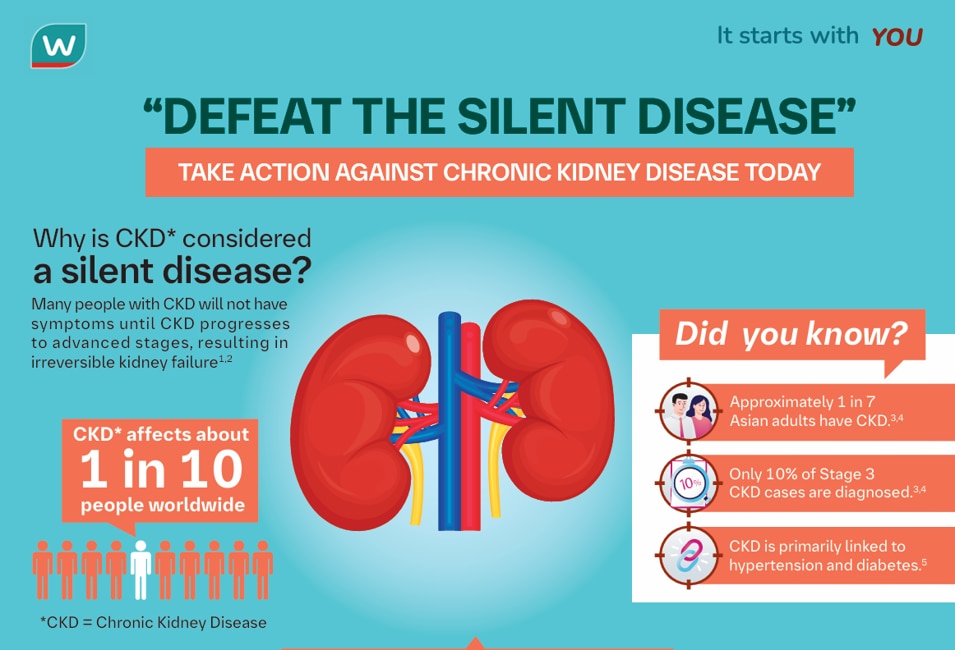
Cardio-renal and metabolic (CRM) disorders like hypertension, heart failure, chronic kidney disease (CKD), or type 2 diabetes mellitus (DM) are chronic conditions that affect you for the rest of your life. These disorders, if left unmanaged or uncontrolled, progress over time and lead to severe complications such as heart attacks, kidney failure, or even death. 1,2,3
Staying committed to your prescribed treatment plan by diligently complying with your medication is the secret to achieving better health outcomes and delaying the progression of these diseases.
Understanding the CRM disorders
- Hypertension is a chronic elevation of blood pressure that can result in an increased risk of heart attack or stroke if not controlled. The increased pressure in the arteries causes the heart to work harder to pump blood effectively. 4, 5
- Heart failure develops when the heart cannot pump blood effectively. Heart failure can develop suddenly, such as after a heart attack. It can also develop slowly over time as a result of other illnesses that weaken the heart, such as hypertension. Progression of heart failure can lead to shortness of breath, fluid buildup in the body, or sudden cardiac arrest. 6
- Chronic kidney disease (CKD) is when the kidneys gradually lose their ability to filter the blood, causing waste buildup. Uncontrolled diabetes and hypertension are some of the most common causes of CKD. Kidney disease often gets worse over time, especially if left untreated or not managed well, and may lead to kidney failure. 7
- Type 2 diabetes mellitus is a chronic metabolic disorder characterized by persistent high blood glucose (blood sugar). Uncontrolled diabetes can cause damage to variousrgans that may lead to life-threatening complications such as kidney failure, heart attacks, or stroke. 8
All these 4 CRM disorders are interrelated. For instance, diabetes causes blood vessels to clog up and increases the risk of heart attack, stroke, or kidney disease, while hypertension contributes to worsening kidney damage when uncontrolled. Heart failure can result suddenly from a heart attack or slowly from uncontrolled hypertension. 6, 9, 10
Urgency of medication compliance
These numbers emphasize the compelling need for you to take control of your health through medication compliance.
- Heart disease remained as the top cause of death in the Philippines in 2024, with 75,446 cases and accounting for 19.4% of the total deaths nationwide. 11
- In 2024, diabetes mellitus ranked 5th as a cause of death with 24,469 deaths. 11
- An estimated 4.3 million Filipinos were diagnosed with diabetes, while 2.8 million remained undiagnosed in 2021. 12
- Approximately 7 million Filipinos suffered from chronic kidney disease in 2021, with 1 Filipino getting the disease every hour. 13
- Approximately 7 million Filipinos suffered from chronic kidney disease in 2021, with 1 Filipino getting the disease every hour. 13
Medication compliance matters
Medication compliance is not just about swallowing pills—it is taking prescribed medicines consistently and correctly as advised by your healthcare provider.
It is essential in managing chronic diseases and attaining treatment success.

Benefits of medication compliance
- Delays disease progression and lowers mortality or risk of death:
- Adherence to proper medications such as SGLT2 inhibitors has been shown to result in significant kidney and heart benefits in people with CKD with and without diabetes. 14
- Proper blood pressure control decreases the risks of kidney damage and cardiovascular events. 15
- Compliance with medication and lifestyle recommendations has been shown to decrease cardiovascular events and mortality in diabetes patients with advanced atherosclerosis. 16
- Prevents complications:
- Regular glucose-lowering medications help prevent diabetes complications like neuropathy or retinopathy. 17,18
- Stricter blood sugar control in persons with diabetes had a 15% reduced risk of heart attacks compared to those with less strict sugar control. 19
- Reduces hospitalizations:
- Guideline-recommended medications have been shown to decrease hospitalizations in patients with heart failure. 20
- Long-term positive effects:
- A longer life expectancy with fewer complications allows individuals to maintain independence and lead more productive lives. 21
- Enhances well-being, reduces anxiety, and improves family relations with less emotional burden from health crises. 22
- Lessens financial difficulties from healthcare expenses such as hospital stays or medical emergencies. In the Philippines, hospitalization for hypertension complications can bankrupt families. 23
The secret to effectively managing chronic conditions like hypertension, heart failure, diabetes, or CKD relies on consistent medication compliance.
By consistently taking your prescribed medications and following physical and dietary advice, you take control of your health, help slow down disease progression and avoid severe complications, reduce hospitalization, and reduce the risk of mortality. Whether it’s managing hypertension, heart failure, CKD, or diabetes, every pill taken correctly is a step toward a longer and better quality of life for yourself and your loved ones.
References:
- Tackling G, Borhade MB. Hypertensive Heart Disease. [Updated 2023 Jun 26]. In: StatPearls [Internet]. Treasure Island (FL): StatPearls Publishing; 2025 Jan-. Available from https://www.ncbi.nlm.nih.gov/books/NBK539800/
- Cleveland Clinic. Chronic Kidney Disease. Cleveland Clinic website. Available from https://my.clevelandclinic.org/health/ diseases/15096-chronic-kidney-disease
- World Health Organization. Diabetes. WHO int website, Available from https://www.who.int/news-room/fact-sheets/ detail/diabetes
- National Institute of Diabetes and Digestive and Kidney Diseases (NIDDK). Diabetes, Heart Disease, & Stroke. NIH-NIDDK website. Available from https://www.niddk.nih.gov/health-information/diabetes/overview/preventing-problems/heart- disease-stroke
- Foex, P, Sear, JW. Hypertension: Pathophysiology and Treatment. Continuing Education in Anaesthesia Critical Care & Pain 4(3): 71-75, June 2004 Available from https://academic.oup.com/bjaed/article/4/3/71/292146
- National Heart, Lung, and Blood Institute (NHLBI). What is Heart Failure? NHLBI website. Available from https:// www.nhlbi.nih.gov/health/heart-failure Accessed 15 April 2025
- National Institute of Diabetes and Digestive and Kidney Diseases (NIDDK). What Is Chronic Kidney Disease? NIH-NIDDK website. Available from https://www.niddk.nih.gov/health-information/kidney-disease/chronic-kidney-disease-ckd/what- is-chronic-kidney-disease
- Goyal R, Singhal M, Jialal I. Type 2 Diabetes. [Updated 2023 Jun 23]. In: StatPearls [Internet]. Treasure Island (FL): StatPearls Publishing; 2025 Jan-. Available from https://www.ncbi.nlm.nih.gov/books/NBK513253/
- Brutsaert E. Diabetes Mellitus (DM). MSD Manual 2023. Available from https://www.msdmanuals.com/home/hormonal- and-metabolic-disorders/diabetes-mellitus-dm-and-disorders-of-blood-sugar-metabolism/diabetes-mellitus-dm
- American Heart Association. High Blood Pressure and Your Kidneys. Heart Org website, Available from https:// www.heart.org/en/health-topics/high-blood-pressure/health-threats-from-high-blood-pressure/high-blood-pressure-and- your-kidneys
- Philippine Statistics Authority (PSA). 2024 Causes of Death in the Philippines (Provisional as of 31 January 2025). PSA website. Available from https://psa.gov.ph/content/2024-causes-death-philippines-provisional-31-january-2025
- Cando, Leslie Faye T., Quebral, Elgin Paul B., Ong, Erika P., Catral, Charlene Divine M., Relador, Ruth Joy L., Velasco, Adrian Jonathan D., Alcazar, Renne Margaret U., Reyes, Nico Alexander L., Pilotin, Er Joshua B., Ornos, Eric David B., Paz-Pacheco, Elizabeth T., Tantengco, Ourlad Alzeus G. Current Status of Diabetes Mellitus Care and Management in the Philippines, Diabetes & Metabolic Syndrome: Clinical Research & Reviews. Volume 18, Issue 2, 2024, 102951, ISSN 1871-4021, https://doi.org/10.1016/j.dsx.2024.102951. Available from https://www.sciencedirect.com/science/article
- Montemayor, MT. 7M Filipinos Have Chronic Kidney Disease As of 2021. Philippine News Agency website. Available from https://www.pna.gov.ph/articles/1202791
- Kidney Health Australia. CKD Management in Primary Care Handbook 5th Ed. Avialable from https://kidney.org.au/health- professionals/ckd-management-handbook Accessed 15 April 2025
- Steigerwalt, Susan. Management of Hypertension in Diabetic Patients With Chronic Kidney Disease. Diabetes Spectr 1 January 2008; 21 (1): 30–36. Available from https://doi.org/10.2337/diaspect.21.1.30
- Shalaeva, E. et al. Impact of Persistent Medication Adherence and Compliance with Lifestyle Recommendations on Major Cardiovascular Events and One-Year Mortality in Patients with Type 2 Diabetes and Advanced Stages of Atherosclerosis: Results from a Prospective Cohort Study. Global Heart. 2023; 18(1):61 Available https://globalheartjournal.com/articles/ 10.5334/gh.1273
- Ang L, Jaiswal M, Martin C, Pop-Busui R. Glucose Control and Diabetic Neuropathy: Lessons From Recent Large Clinical Trials. Curr Diab Rep. 2014;14(9):528. doi: 10.1007/s11892-014-0528-7. PMID: 25139473; PMCID: PMC5084623. Available from https://pmc.ncbi.nlm.nih.gov/articles/PMC5084623/
- Kropp M, Golubnitschaja O, Mazurakova A, Koklesova L, Sargheini N, Vo TKS, de Clerck E, Polivka J Jr, Potuznik P, Polivka J, Stetkarova I, Kubatka P, Thumann G. Diabetic Retinopathy As the Leading Cause of Blindness and Early Predictor of Cascading Complications-Risks and Mitigation. EPMA J. 2023 Feb 13;14(1):21-42. doi: 10.1007/ s13167-023-00314-8. PMID: 36866156; PMCID: PMC9971534. Available from https://pmc.ncbi.nlm.nih.gov/articles/ PMC9971534/
- Mazzone T. Intensive Glucose Lowering and Cardiovascular Disease Prevention in Diabetes: Reconciling the Recent Clinical Trial Data. Circulation. 2010 Nov 23;122(21):2201-11. doi: 10.1161/CIRCULATIONAHA.109.913350. PMID: 21098460; PMCID: PMC3005220. Available from https://pmc.ncbi.nlm.nih.gov/articles/PMC3005220/ #:~:text=Results%20of%20this%20analysis%20showed,to%20less%20intensive%20glucose%20control.
- Rangaswami, J. et al. AHA Scientific Statement: Cardiorenal Syndrome: Classification, Pathophysiology, Diagnosis, and Treatment Strategies. Circulation. 2019;139:e840-e878. Available from https://www.ahajournals.org/doi/10.1161/CIR. 0000000000000664
- Shruthi R, Jyothi R, Pundarikaksha HP, Nagesh GN, Tushar TJ. A Study of Medication Compliance in Geriatric Patients with Chronic Illnesses at a Tertiary Care Hospital. J Clin Diagn Res. 2016 Dec;10(12):FC40-FC43. doi: 10.7860/JCDR/ 2016/21908.9088. Epub 2016 Dec 1. PMID: 28208878; PMCID: PMC5296451. Available from https:// pmc.ncbi.nlm.nih.gov/articles/PMC5296451/
- Ayodapo, Abayomi O.; Monsudi, Kehinde Fasasi1; Omosanya, Olusegun Emmanuel2; Elegbede, Olayide Toyin2. Family Functioning and Adherence to Medication: A Study of Hypertensive in a Tertiary Hospital, South Western Nigeria. CHRISMED Journal of Health and Research 5(3):p 197-202, Jul–Sep 2018. | DOI: 10.4103/cjhr.cjhr_28_18. Available from https://journals.lww.com/chri/fulltext/2018/05030/family_functioning_and_adherence_to_medication a.7.aspx
- Dela Rosa JGL, Catral CDM, Reyes NA, Opiso DMS, Ong EP, Ornos EDB, Santos JR, Quebral EPB, Callanta MLJ, Oliva RV, Tantengco OAG. Current Status of Hypertension Care and Management in the Philippines. Diabetes Metab Syndr. 2024 Apr;18(4):103008. doi: 10.1016/j.dsx.2024.103008. Epub 2024 Apr 16. PMID: 38640838. Available from https:// pubmed.ncbi.nlm.nih.gov/38640838/
Document No: NP-PH-100303 | Production Date: May 2025







